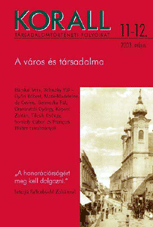A város meghatározásának problémái a 19. századi Európában
Problems of the Definition of Town in the 19th Century Europe
Author(s): François WalterSubject(s): History
Published by: KORALL Társadalomtörténeti Egyesület
Keywords: social history; urban history; Europe; 19th century; historiography; concept of town
Summary/Abstract: For numerous European countries, the 19th century has been the century of the city and of its spectacular growth. This article questions the effects of city transformations on the archetypal perception of the urban form in Occident: this one imposes as evidence that the city can only exist when bounded and delimited. The first part details the tension between two tendencies: one pushes for the demolition of fortifications parallel to the extension of the city, the other one develops complex strategies of reconstruction of the urban limits. In the second part, we show how formal modifications of the urban fabric are accompanied by a redefinition of the status of cities. In particular, it has been necessary to find definitions of the city based on something other than the evidence of the closed form. This is how, in continental Europe, we experiment with two main traditions. One of French inspiration favours the statistical definition, the other of Germanic inspiration insists on a juridical conception of the city. The third part of the article moves on to the complex question of the social repercussions of these evolutions; more precisely, it shows how the forms of the social cohesion alter. The attachment to the territory of the city through the system of bourgeoisies loses its relevance. New forms of appropriation of the urban space superimpose old ones.
Journal: Korall - Társadalomtörténeti folyóirat
- Issue Year: 2003
- Issue No: 11-12
- Page Range: 183-198
- Page Count: 16
- Language: Hungarian

